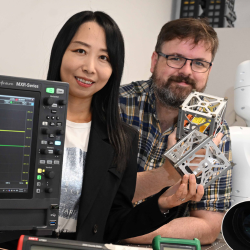-
Study
-
Undergraduate
- Search for a Course
- Undergraduate Open Day & Events
- Application Guides
- Northumbria University UCAS Exhibitions
- Foundation Years
- Undergraduate Fees & Funding
- School & College Outreach
- Continuing Professional Development
-
Postgraduate
- Postgraduate Study Degree
- Postgraduate Research Degrees
- Postgraduate Open Days and Events
- Postgraduate Fees & Funding
- Flexible Learning
- Thinking about a Masters?
- Continuing Professional Development
- Change Direction
-
Student Life
- The Hub - Student Blog
- Accommodation
- Life in Newcastle
- Support for Students
- Careers
- Information for Parents
- Students' Union
- Northumbria Sport
- Be Part of It
-
-
International
International
Northumbria’s global footprint touches every continent across the world, through our global partnerships across 17 institutions in 10 countries, to our 277,000 strong alumni community and 150 recruitment partners – we prepare our students for the challenges of tomorrow. Discover more about how to join Northumbria’s global family or our partnerships.
View our Global Footprint-
Applying to Northumbria
- European Union
- Our London Campus
- Northumbria Pathway
- International Events
- Entry Requirements and Country Representatives
- Regional Offices
-
Northumbria Language Centre
- Faculty Requirements
- Acceptable English Requirements
- Pre-sessional English Language and Study Skills
- Academic Language Skills Programmes (ALS)
-
International Fees, Funding & Scholarships
- International Undergraduate Fees
- International Undergraduate Funding
- International Masters Fees
- International Masters Funding
- International Postgraduate Research Fees
- International Postgraduate Research Funding
- International Money Matters
-
Life at Northumbria
- International student support
- Careers
-
International Mobility
- Current Northumbria Students
- Incoming Exchange Students
-
-
Business
Business
The world is changing faster than ever before. The future is there to be won by organisations who find ways to turn today's possibilities into tomorrows competitive edge. In a connected world, collaboration can be the key to success.
More on our Business Services -
Research
Research
Northumbria is a research-rich, business-focused, professional university with a global reputation for academic quality. We conduct ground-breaking research that is responsive to the science & technology, health & well being, economic and social and arts & cultural needs for the communities
Discover more about our Research -
About Us
-
About Northumbria
- Our Strategy
- Our Staff
- Place and Partnerships
- Student Profiles
- Alumni Profiles
- Leadership & Governance
- Academic Departments
- University Services
- History of Northumbria
- Contact us
- Online Shop
-
-
Alumni
Alumni
Northumbria University is renowned for the calibre of its business-ready graduates. Our alumni network has over 244,000 graduates based in 178 countries worldwide in a range of sectors, our alumni are making a real impact on the world.
Our Alumni - Work For Us
What will I learn on this module?
The lectures covering the theoretical/standards components of network services and functionality and how they map to a business infrastructure.
The Seminars will cover the current operating systems support for these protocols and services and allow the student to implement these services/facilities and apply them to business needs with a theoretical underpinning.
This module aims to provide an experience in the practical use and application of an operating system in a network environment to provide the essential services required for a commercial organisation.
This module will allow the student to develop skills in the configuration of an operating systems in a networked environment.
The module provides an opportunity for the student to develop an appreciation of services and the practical skills required for developing and deploying network services into a corporate infrastructure.
How will I learn on this module?
The module will be taught as a combination of lectures and seminars.
The lectures covering the theoretical/standards components of network services and functionality and how they map to a business.
The Seminars will cover the current operating systems support for these protocols and services and allow the student to implement these services/facilities and apply them to business needs with a theoretical underpinning.
How will I be supported academically on this module?
You will be supported by laboratory supervision and by being direction to suitable white papers and textbooks.
What will I be expected to read on this module?
All modules at Northumbria include a range of reading materials that students are expected to engage with. Online reading lists (provided after enrolment) give you access to your reading material for your modules. The Library works in partnership with your module tutors to ensure you have access to the material that you need.
What will I be expected to achieve?
Knowledge & Understanding:
1. Select appropriate features of an operating system for computer network implementation.
Intellectual / Professional skills & abilities:
2. Justify the integration of network services at the intranet and internet level for a commercial organisation.
3. Configure networking functions such as, web servers, DNS, file sharing and databases.
Personal Values Attributes (Global / Cultural awareness, Ethics, Curiosity) (PVA):
4. Appreciate the impact of network services for both local and global implementations.
How will I be assessed?
Summative assessment will be an assignment covering the theoretical aspects and configuration of networking technologies to show an understanding of current trends in network services deployment.
The configuration component will be drawn from practical work that they must complete in the lab. (The assessment will cover all MLO's)
The feedback will then be via a rubric based feedback sheet.
Pre-requisite(s)
None
Co-requisite(s)
None
Module abstract
1. Students will be expected to research current publications on network protocols and network services
2. Students will be taught specific aspects of network operating system.
3. Directed learning will direct students towards specific standards (ietf standards RFC's) and texts.
4. The students will be required to produce a technical report that is specifically focused towards the subject area.
Course info
UCAS Code GF44
Credits 20
Level of Study Undergraduate
Mode of Study 3 years Full Time or 4 years with a placement (sandwich)/study abroad
Department Computer and Information Sciences
Location City Campus, Northumbria University
City Newcastle
All information is accurate at the time of sharing.
Full time Courses are primarily delivered via on-campus face to face learning but could include elements of online learning. Most courses run as planned and as promoted on our website and via our marketing materials, but if there are any substantial changes (as determined by the Competition and Markets Authority) to a course or there is the potential that course may be withdrawn, we will notify all affected applicants as soon as possible with advice and guidance regarding their options. It is also important to be aware that optional modules listed on course pages may be subject to change depending on uptake numbers each year.
Contact time is subject to increase or decrease in line with possible restrictions imposed by the government or the University in the interest of maintaining the health and safety and wellbeing of students, staff, and visitors if this is deemed necessary in future.
Useful Links
Find out about our distinctive approach at
www.northumbria.ac.uk/exp
Admissions Terms and Conditions
northumbria.ac.uk/terms
Fees and Funding
northumbria.ac.uk/fees
Admissions Policy
northumbria.ac.uk/adpolicy
Admissions Complaints Policy
northumbria.ac.uk/complaints














